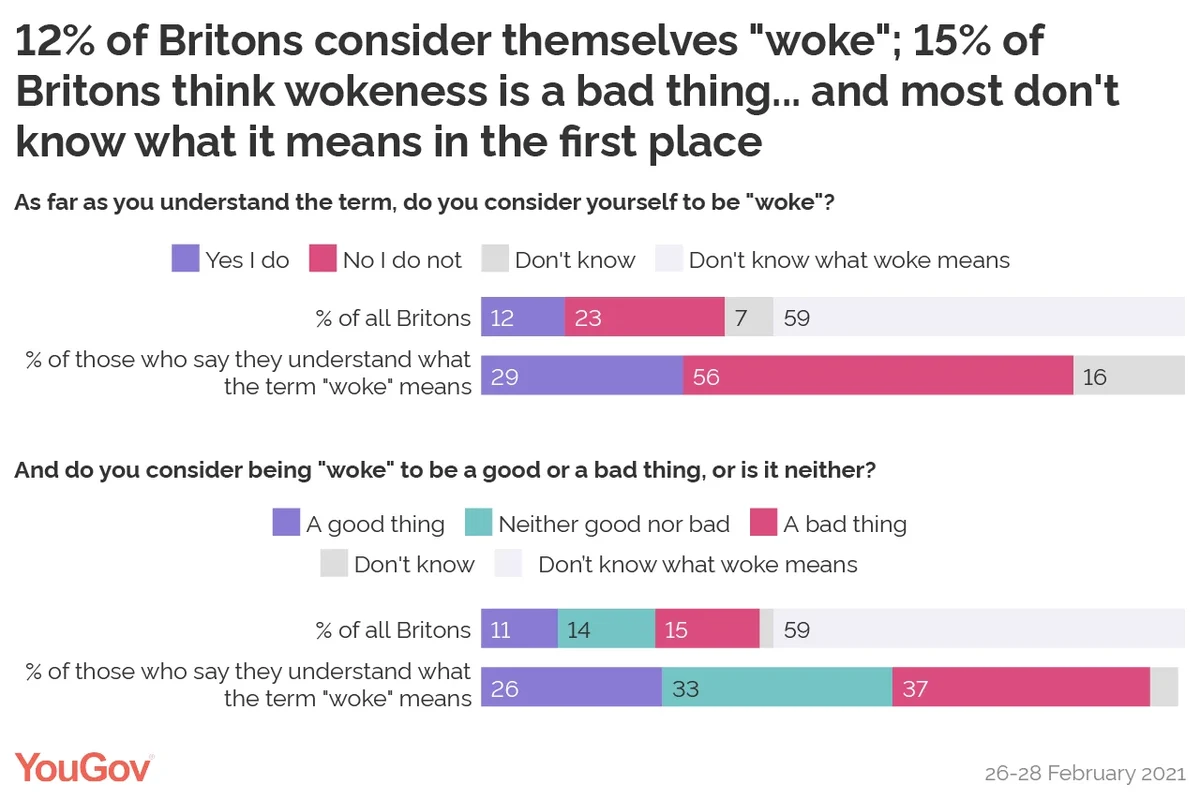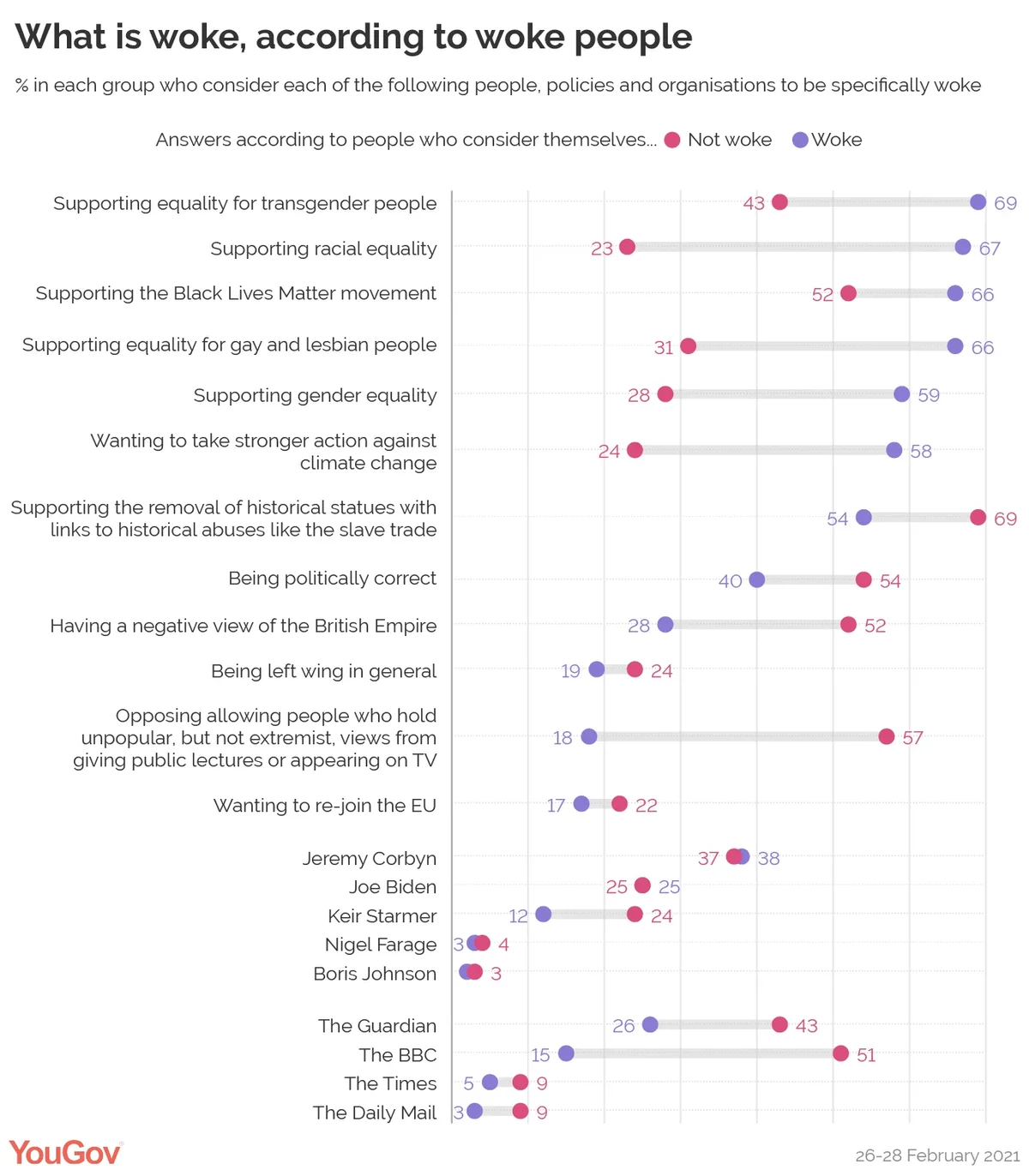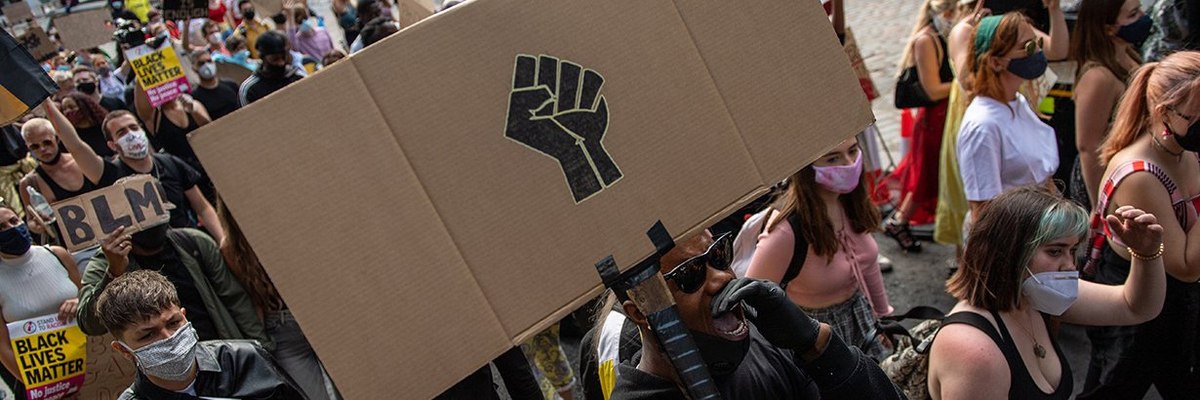YouGov explores how many Britons understand the term, and who and what they consider to be woke
A more recent update to this survey can be found here
One of the political words of the moment is “woke”. As with so many parts of British political discourse, it is an import from the United States – and as with so many other things in the USA, its origin is in the Black community before being co-opted and eventually distorted by mainstream white people.
Originally the term referred to a need to wake up to, and stay ‘woke’ to, the realities of Black people’s place in America and the system designed to keep them down. With the term becoming more mainstream recently it evolved to mean a more general sense of awareness to social injustice against all groups, although it remains closely associated with the Black Lives Matter movement.
To opponents of the social aims of such movements, however, it has become a catch-all term for a certain type of socially liberal ideology they dislike – much as the term ‘political correctness’ can often be.
How many Britons know what the term “woke” means?
As with so many terms bandied about in political discourse, most Britons (59%) don’t know what “woke” means, half of whom (30%) have never heard the term being used in the first place.
This leaves 41% of Britons who say they have heard “woke” being used and believe they know what it means. The rest of this article will examine the views of this group specifically, looking at their attitudes towards the term, and what they think it applies to.
Of those who say they know what woke is, only three in ten (29%) consider themselves to be woke, while more than half (56%) do not.
One in four consider being woke to be a good thing (26%), while slightly more than a third (37%) think it a bad thing. Another third (33%) say wokeness is neither good nor bad.

Three quarters of 2019 Conservative voters who understand the term see wokeness as a bad thing (74%), while Labour voters are torn, with 42% seeing it as good, and another 43% seeing it as neither good nor bad.
More than eight in ten of those who think wokeness is a good thing also consider themselves woke (83%), with most of the remainder (14%) unsure.
Who is woke?
In January of this year Boris Johnson was caught off guard by a question on whether incoming US president Joe Biden was woke. The prime minister ultimately didn’t answer, although he did say there is “nothing wrong” with being woke.
Of those who understand the term, only 22% see the US president as woke. Another 39% say that although he is not specifically woke, he probably holds some woke views, while 16% think Biden is not woke at all.
When it comes to British politicians, the label is most likely to be applied to Jeremy Corbyn, at 34%. His successor as Labour leader, Keir Starmer, is seen as woke by only half as many, at 17%. Only 2% of those who understand the term see Boris Johnson as woke; 62% say he is not woke at all, while 22% say that although not woke he probably holds some woke opinions.
Those who consider themselves woke and those who don’t considered each of the politicians to be woke at similar rates, with one exception – Keir Starmer. Those who say they themselves are not woke are twice as likely to see the current Labour leader as woke (24%) than those who believe themselves to be woke (12%).
For all political figures we asked about, 12-20% of people who say they understand what “woke” were unable to put a level of wokeness to those politicians.
When it comes to the media, The Guardian and the BBC are equally likely to be seen as woke, at 34%, compared to 7% for The Times and 6% for the Daily Mail (although the Mail is much more likely to be seen as not woke at all, at 60% to The Times’s 34%).
There is a big difference in opinion between the woke and not-woke when it comes to the BBC and the Guardian. People who consider themselves not to be woke are much more likely to consider both entities to be woke, by 51% vs 15% of woke people in the case of the BBC, and by 43% to 26% in the case of the Guardian.
Again, many people who claimed to understand the term “woke” (17-32%) couldn’t say to what extent the label applies to these media organisations.
What beliefs are woke?
When it comes to what constitutes wokeness, the view most commonly associated with the term is supporting the removal of historical statues with links to historical abuses like the slave trade, according to 60% of those who say they know what the term means. Similarly, supporting the Black Lives Matter movement is considered woke by 56% of this group.
Supporting equality for transgender people is woke according to 52% of those who say they understand the term, compared to 43% for supporting equality for gay and lesbian people, 40% for supporting gender equality and 39% for supporting racial equality.
Being left wing is not a sufficient qualification for being considered woke, with just 21% saying so. Similar numbers say the same of those who want to rejoin the EU (19%). Being politically correct is more likely to see a person tarred with the woke brush, at 46%.
Britons who do and don’t consider themselves woke have completely different conceptions of what it is to be woke.
Woke Britons are substantially more likely to consider supporting equality for social groups, supporting the Black Lives Matter movement, and wanting to take stronger action on climate change to be woke.
By contrast, Britons who consider themselves not-woke are more likely than their woke counterparts to think opposing certain people from giving public lectures/appearing on TV, supporting removal of statues linked to the slave trade, and having a negative view of the British Empire to be woke.

These stances labelled woke by those who are not-woke are what might be described as the most prominent cases in the ongoing ‘culture wars’, at least in terms of their prominence in the media. The fact that support for social groups – like women, gay people and ethnic minorities – is not seen as a marker for wokeness by the not-woke suggests a reluctance on their part to brand things they otherwise support as “woke”, suggesting it is more of a label reserved for a particular subsection of disliked political behaviour.









